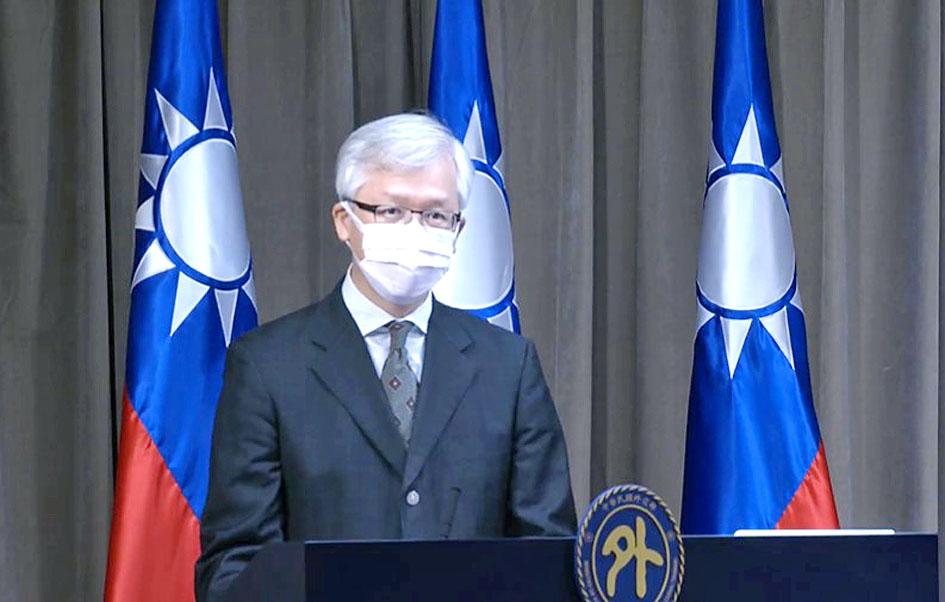Washington has been in talks with Taipei for the past few weeks in preparation for the unveiling of its China strategy yesterday, the Ministry of Foreign Affairs said.
Communications between the US and Taiwan were “intense” in the run-up to US Secretary of State Antony Blinken’s speech on China policy at George Washington University, the ministry said.
The contents of those discussions are being kept private, ministry deputy spokesman Tsuei Ching-lin (崔靜麟) said at a news conference.

Photo: Lu Yi-hsuan, Taipei Times
Blinken outlined US President Joe Biden administration’s policy toward China at the university at 10am yesterday in Washington.
The speech, which had been postponed from early last month after Blinken tested positive for COVID-19, came on the heels of Biden’s trip to Asia this week, which ended on Tuesday, and was reportedly aimed at reinvigorating relationships with US allies to counter China’s influence in the region.
During Biden’s visit to Japan, he said in response to a reporter’s question that the US would intervene militarily if China were to attack Taiwan.
Biden’s off-the-cuff remark was interpreted by some people as a more open commitment of US intervention, or “strategic clarity,” and a deviation from the US’ policy of “strategic ambiguity,” which allows it to remain vague about its response to a potential attack on Taiwan by China.
However, Biden on Tuesday said that the US policy of strategic ambiguity on Taiwan “has not changed at all,” after he met with his colleagues at the leaders’ summit of the Quad nations, including prime ministers Fumio Kishida of Japan, Anthony Albanese of Australia and Narendra Modi of India.

Taiwan has received more than US$70 million in royalties as of the end of last year from developing the F-16V jet as countries worldwide purchase or upgrade to this popular model, government and military officials said on Saturday. Taiwan funded the development of the F-16V jet and ended up the sole investor as other countries withdrew from the program. Now the F-16V is increasingly popular and countries must pay Taiwan a percentage in royalties when they purchase new F-16V aircraft or upgrade older F-16 models. The next five years are expected to be the peak for these royalties, with Taiwan potentially earning

STAY IN YOUR LANE: As the US and Israel attack Iran, the ministry has warned China not to overstep by including Taiwanese citizens in its evacuation orders The Ministry of Foreign Affairs (MOFA) yesterday rebuked a statement by China’s embassy in Israel that it would evacuate Taiwanese holders of Chinese travel documents from Israel amid the latter’s escalating conflict with Iran. Tensions have risen across the Middle East in the wake of US and Israeli airstrikes on Iran beginning Saturday. China subsequently issued an evacuation notice for its citizens. In a news release, the Chinese embassy in Israel said holders of “Taiwan compatriot permits (台胞證)” issued to Taiwanese nationals by Chinese authorities for travel to China — could register for evacuation to Egypt. In Taipei, the ministry yesterday said Taiwan

Taiwan is awaiting official notification from the US regarding the status of the Agreement on Reciprocal Trade (ART) after the US Supreme Court ruled US President Donald Trump's global tariffs unconstitutional. Speaking to reporters before a legislative hearing today, Premier Cho Jung-tai (卓榮泰) said that Taiwan's negotiation team remains focused on ensuring that the bilateral trade deal remains intact despite the legal challenge to Trump's tariff policy. "The US has pledged to notify its trade partners once the subsequent administrative and legal processes are finalized, and that certainly includes Taiwan," Cho said when asked about opposition parties’ doubts that the ART was

If China chose to invade Taiwan tomorrow, it would only have to sever three undersea fiber-optic cable clusters to cause a data blackout, Jason Hsu (許毓仁), a senior fellow at the Hudson Institute and former Chinese Nationalist Party (KMT) legislator, told a US security panel yesterday. In a Taiwan contingency, cable disruption would be one of the earliest preinvasion actions and the signal that escalation had begun, he said, adding that Taiwan’s current cable repair capabilities are insufficient. The US-China Economic and Security Review Commission (USCC) yesterday held a hearing on US-China Competition Under the Sea, with Hsu speaking on